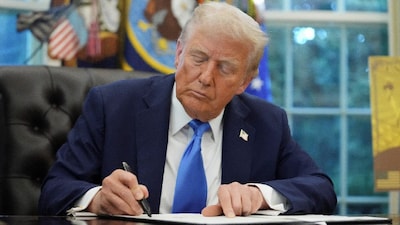Trump Declares 100% Tariff on Pharma Imports from October 1, India Faces Uncertainty

Trump Declares 100% Tariff on Pharma Imports from October 1, India Faces Uncertainty
Move targets branded and patented drugs; Indian pharma sector braces for impact
US President Donald Trump has announced a sweeping 100 per cent tariff on all branded and patented pharmaceutical imports, effective October 1, 2025—a move that could hit India’s drug industry hard.
“Starting October 1st, 2025, we will be imposing a 100 per cent Tariff on any branded or patented Pharmaceutical Product, unless a Company IS BUILDING their Pharmaceutical Manufacturing Plant in America,” Trump said in a Truth Social post, clarifying that “IS BUILDING” would mean “breaking ground” or being “under construction.” Products linked to such projects would be exempt.
The decision underscores Trump’s tariff-heavy economic strategy, which he claims will strengthen domestic manufacturing and cut the US budget deficit. Alongside the pharma announcement, he also imposed fresh tariffs of 50 per cent on kitchen cabinets and bathroom vanities, 30 per cent on upholstered furniture, and 25 per cent on heavy trucks. He framed the measures as necessary for “National Security and other reasons,” though no legal justification was provided.
India in the Crosshairs
The US is India’s biggest pharmaceutical export market. In FY24, India exported $27.9 billion worth of drugs globally, of which $8.7 billion (31 per cent) went to America. In just the first half of 2025, exports touched $3.7 billion. India supplies more than 45 per cent of generic drugs and 15 per cent of biosimilars consumed in the US.
Major Indian firms such as Dr Reddy’s, Aurobindo Pharma, Zydus Lifesciences, Sun Pharma, and Gland Pharma rely heavily on the American market, with 30–50 per cent of their revenues coming from US sales.
Possible Fallout
Though the latest tariffs appear aimed at multinational giants selling branded and patented drugs, uncertainty remains over whether complex generics and speciality medicines from India will also be included. Some large Indian companies already operate manufacturing facilities in the US, potentially softening the blow.
Analysts warn that higher tariffs could disrupt America’s supply of affordable generics, driving up drug prices, fuelling inflation, and creating shortages. For Indian firms, already operating on thin margins, absorbing additional costs may prove impossible—forcing them to pass expenses onto US consumers and insurers.
Trump has already imposed a 50 per cent tariff on Indian imports earlier this year, including a 25 per cent “penalty” linked to India’s continued purchase of Russian oil. The new pharma tariffs mark another escalation in his protectionist trade agenda, with ripple effects likely to be felt across both economies.












